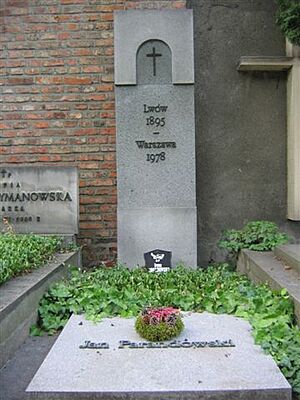Jan Parandowski facts for kids
Jan Parandowski (born May 11, 1895 – died September 26, 1978) was a famous Polish writer, essayist, and translator. He is best known for his books about classical antiquity, which means the ancient Greek and Roman worlds. He was also the president of the Polish PEN Club for many years. This club is a group of writers who work to promote literature and freedom of speech.
Jan Parandowski was born in a city called Lwów, which was part of Austria-Hungary at the time. He passed away in Warsaw, Poland.
Contents
Jan Parandowski's Life Story
Jan Parandowski finished high school in Lwów. In 1913, he started studying philosophy at the University of Lwów. He also learned about classical philology (the study of language and literature), archeology (the study of old things), art history, and Polish literature.
However, he had to stop his studies because of World War I. During this time, he taught at schools in Russia. In 1920, he was able to go back to university. By 1923, he earned his Master's degree in classical philology and archeology.
Early Career and Travels
From 1922 to 1924, Jan Parandowski worked as a literary chief for a publisher named Alfred Altenberg. He helped create collections of translated classical books and a series about "great writers." Between 1924 and 1926, he traveled to Greece, France, and Italy. These trips helped him learn even more about the ancient world.
In 1929, he moved to Warsaw. There, he became an editor for a monthly magazine called Warsaw Diary. In 1930, he joined the Polish PEN Club. By 1933, he became its president, a role he held for a long time.
Achievements and World War II
At the 1936 Summer Olympics in Berlin, Jan Parandowski won a bronze medal for his book, The Olympic Discus. This book was about the ancient Olympic Games. In 1937, he received the "Gold Laurels" award from the Polish Literary Academy for his amazing writing. He also edited a series of educational books called Great People.
When World War II began, he secretly worked to keep Polish culture alive. Sadly, during the Warsaw Uprising (a major fight in Warsaw), his home was destroyed. He lost all his notes and books that had not yet been published.
After the War and Later Years
After the war, from 1945 to 1950, he taught at the Catholic University of Lublin. He taught about classical antiquity and comparative literature. He also became a member of the Warsaw Association of Sciences. He wrote for different magazines and continued his work as the head of the Polish PEN Club. In 1948, he helped organize a big meeting of thinkers in Wrocław.
In 1958, Jan Parandowski organized an international meeting for translators in Warsaw. In 1962, he became the vice-president of International PEN. He received the Polish State Award in 1964. In the same year, he signed a letter with 33 other scholars and writers. This letter, called the "List of 34," was written to protect freedom of speech.
In 1975, he was honored for all his life's work by Radio Free Europe. In 1976, he received an honorary doctorate from the Catholic University of Lublin. This is a special degree given to honor someone's achievements.
In 1988, a special award was created in his name, the Jan Parandowski prize. The Polish PEN Club gives this award every year to excellent historical writers.
Jan Parandowski's Books and Translations
Jan Parandowski started writing in 1913. He became famous around the world after his book Mythology was published in 1924. People loved his deep knowledge, clear writing style, and how he could write about interesting topics. In Poland, his books are still used in schools to teach about classical history.
Books He Translated
- (1924) Historia świata Wellsa (The Outline of History by H. G. Wells)
- (1925) Dafnis i Chloe (Daphnis and Chloe)
- (1935) Życie Karola Wielkiego Einharda (The Life of Charlemagne by Einhard)
- (1951) Wojnę domową Juliusza Cezara (Civil Wars by Julius Caesar)
- (1953) Odyseja Homera (Homer's Odyssey)
Travel Stories He Wrote
- (1924) Rzym czarodziejski (Magical Rome)
- (1927) Dwie wiosny (Two Springs)
- (1958) Podróże literackie (Literary Journeys)
See also
 In Spanish: Jan Parandowski para niños
In Spanish: Jan Parandowski para niños


